On View
In Paris, Chloé’s New Exhibition Space Exemplifies Why Art Is Fashion’s Ultimate Accessory
The exhibition pairs archival pieces with shoots by Guy Bourdin, the photographer who photographed Chloé the most.
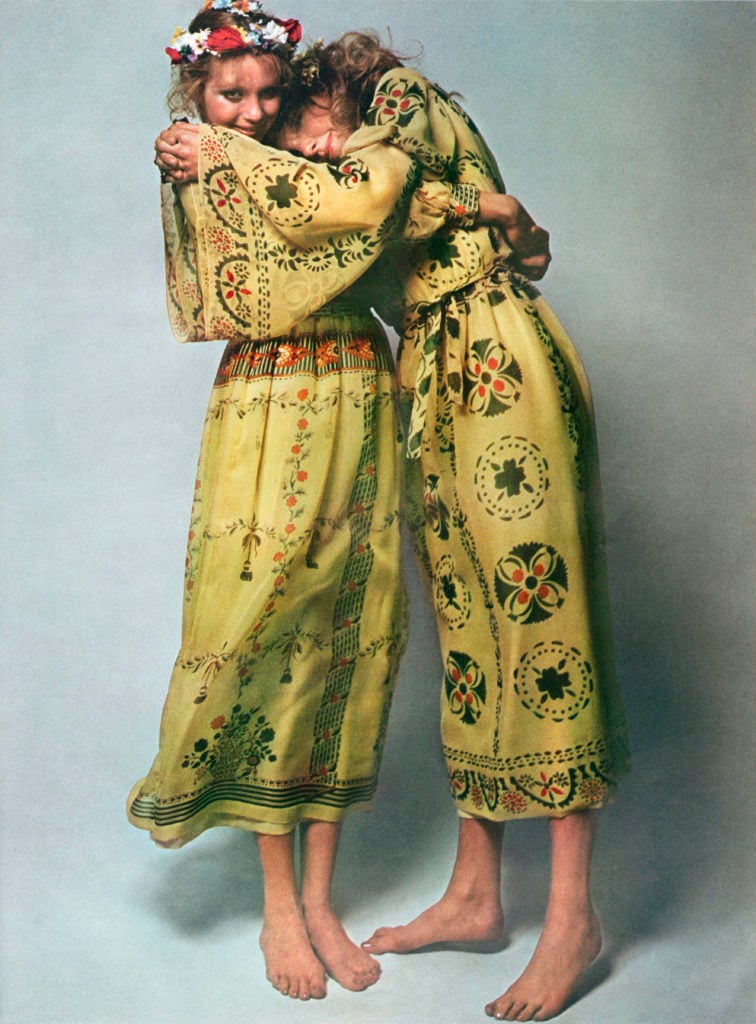
The exhibition pairs archival pieces with shoots by Guy Bourdin, the photographer who photographed Chloé the most.

Dan Thawley

This past Sunday, in the midst of Paris’s busy Couture Week, the French luxury fashion house Chloé unveiled its new cultural space, the Maison Chloé. The beautifully restored, multifunctional Belle-Époque building houses the brand’s archives and showrooms, but four of its five stories are dedicated to a public exhibition space, which was inaugurated this past weekend with the show “Femininities—Guy Bourdin.”
Fashion’s love affair with the art world seems an insatiable reality for the moment, and one that is feeding an industry’s constant need for new imagery and storytelling content in both the physical and digital worlds. The idea of a brick-and-mortar base where a fashion house may exhibit and celebrate its patrimony is important for several reasons. Often, it’s an industry-facing statement of infrastructural power and refinement; more rarely, it can act as a space where both insiders and the general public can interact with a brand’s ideology and cultural identity in a wider context.
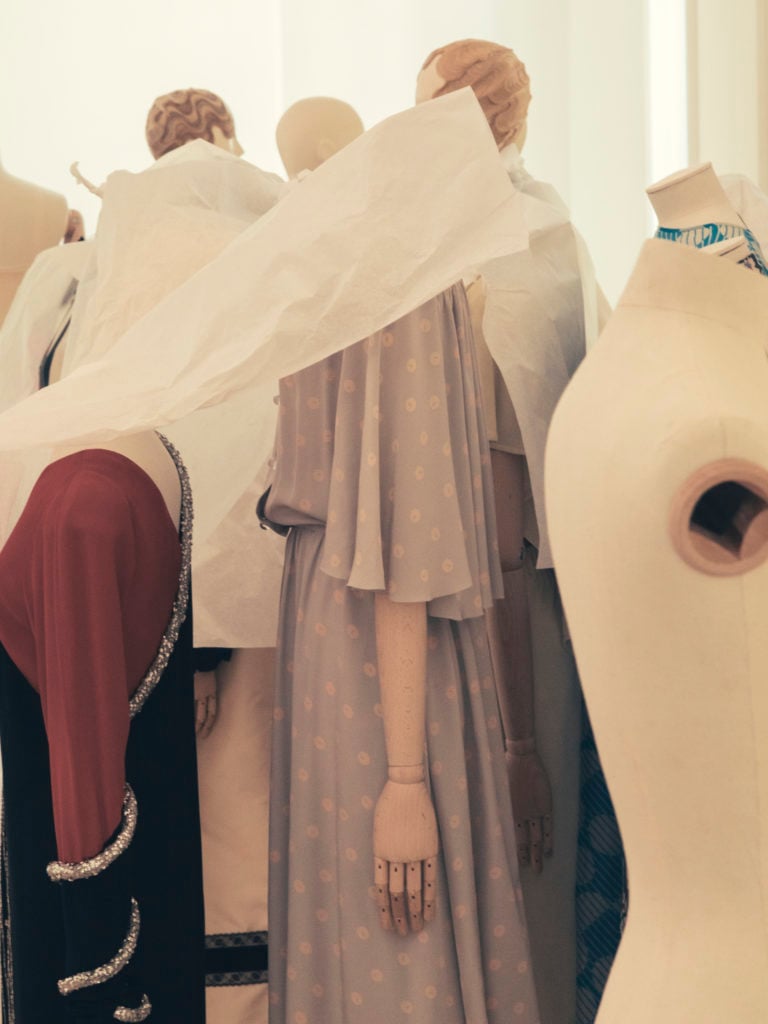
Inside the Maison Chloé
Though it would be unsuitable to compare Chloé’s newly opened Parisian headquarters to the juggernaut projects of the Fondazione Prada, Fondation Louis Vuitton, or François Pinault’s Venice (and soon-to-open Paris) locations, its end goals are not dissimilar, and are the latest example of fashion houses collecting art and employing the exhibition format as a platform for visibility.
“I think there is a completely different level of engagement now,” says the British curator Judith Clark, charged with Chloé’s first show “Femininities—Guy Bourdin,” a photography and fashion exhibition that opened this Sunday across four floors of their new 30,000-square-foot space in Paris’s 8th arrondissement.
“Before, either you worked in a museum and you purchased something, or you were a brand that looked after its own collections and history,” she explained, discussing the garments selected for the show. “Now I think there’s this opportunity for actively collecting, not only conserving but actually engaging by researching the history of the brand and recovering as many versions of the story as possible.”
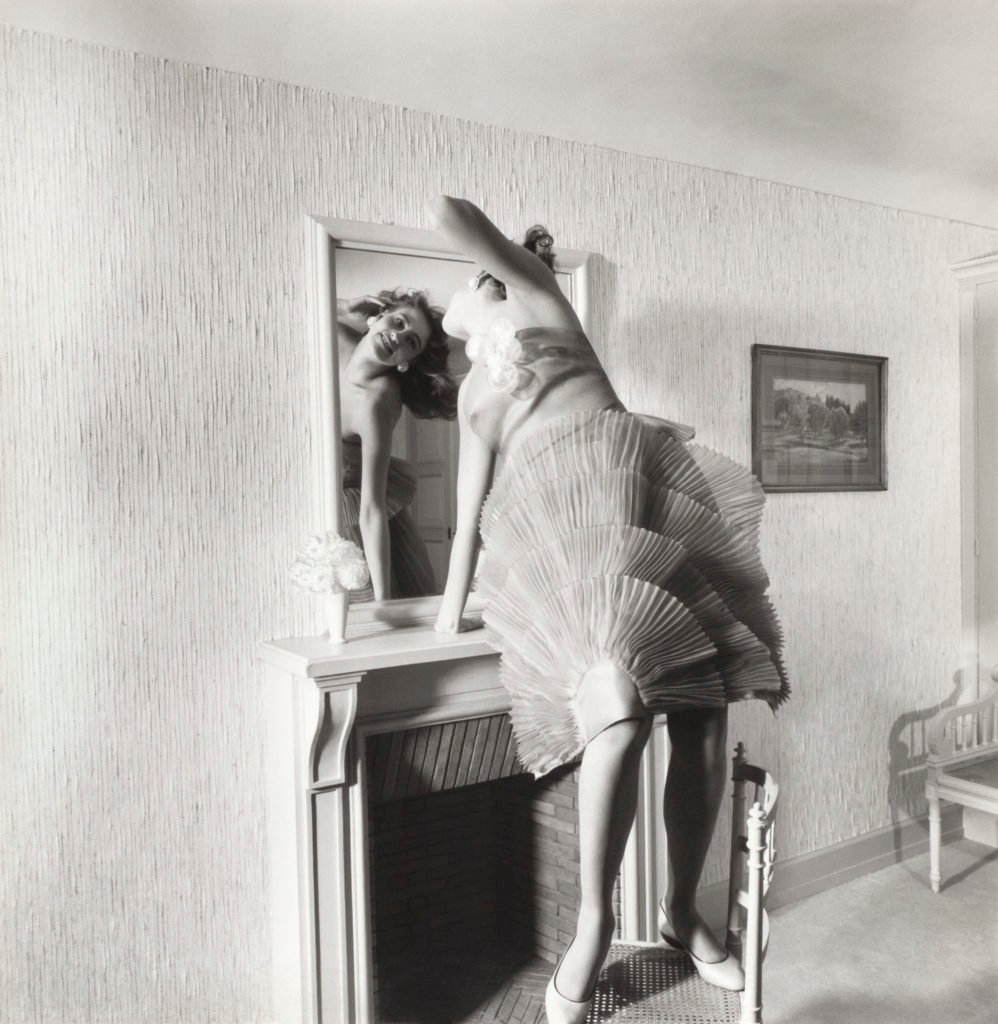
Guy Bourdin, Paris Vogue 1980, Chloé spring-summer 1980 collection ©The Guy Bourdin Estate, 2017 / Courtesy A + C
Clark is no stranger to the fashion house, having curated its “Attitudes” retrospective exhibition at the Palais de Tokyo in 2012, a fact she says heavily influenced her approach towards this second project. “When you have the opportunity to work with an archive for a second time, you aren’t looking for iconic garments because you think there is a right or wrong—when you become familiar with an archive you can be free to play, which is an ideal at the heart of Chloé. So the very thing that is at the core of the brand became true by virtue of the freedom afforded to me as a curator. I think it comes full circle.”
Centered on the prolific imagery created by the French photographer—depicting Chloé designs from as early as the late 1950s through to the early 1980s—the exhibition unfolds throughout the renovated 1903 hotel particulier at 28 Rue de la Baume in staged installations of Bourdin’s framed prints contrasted with the garments and accessories he photographed, as well as the physical magazines they appeared in—most often the “collections pages” of Vogue Paris at the time.
Of note are 40 prints acquired by Chloé for the permanent collection it started in 2011, an investment that preserves the memory of certain garments of which no physical trace exists today.
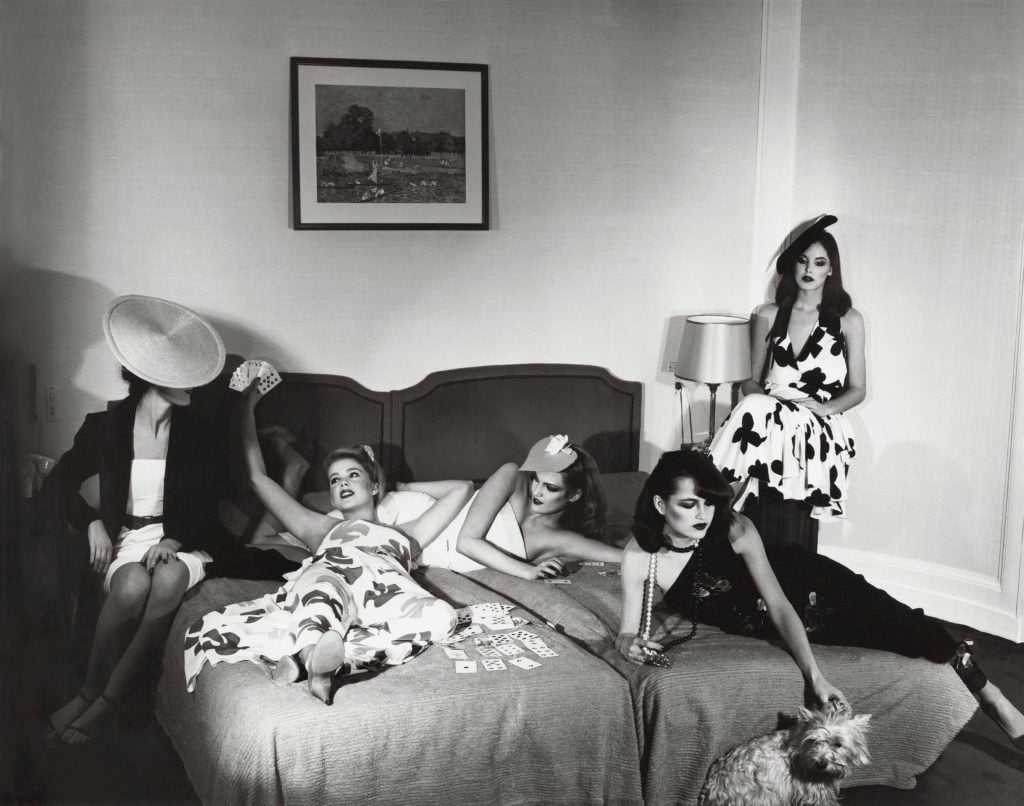
Guy Bourdin, Paris Vogue 1979, Chloé spring-summer 1979 collection
©The Guy Bourdin Estate, 2017 / Courtesy A + C
“The acquisition of Guy Bourdin’s photography by the house is a very important part of this show,” says Clark, keen to emphasize the cultural gravitas such a move can bring to a fashion house. “When you look into this archive, you see that there was this incredible collaboration between Bourdin and Chloé, and whatever the rules were, Chloé is depicted by Bourdin over and over again—sometimes the only evidence that we have of a garment is a photograph by Bourdin. To collect those images is incredible, in terms of both of their histories.”
“As for Bourdin’s work,” she adds, “this chapter is a slightly left-field case study, but when you see how many of these images were produced it suddenly becomes a sizable thing.”
As a case study, the exhibition reveals some of Bourdin’s most feminine, romantic images—often far from the vamp-ish, surrealist pictures for which he is remembered. “We are very proud to inaugurate our artistic programming with Guy Bourdin, the photographer who photographed Chloé the most,” says Chloé CEO Geoffroy de la Bourdonnaye. “Bourdin was audacious and provocative, but when he chose Chloé to dress his models he always brought a softer touch to his style.”
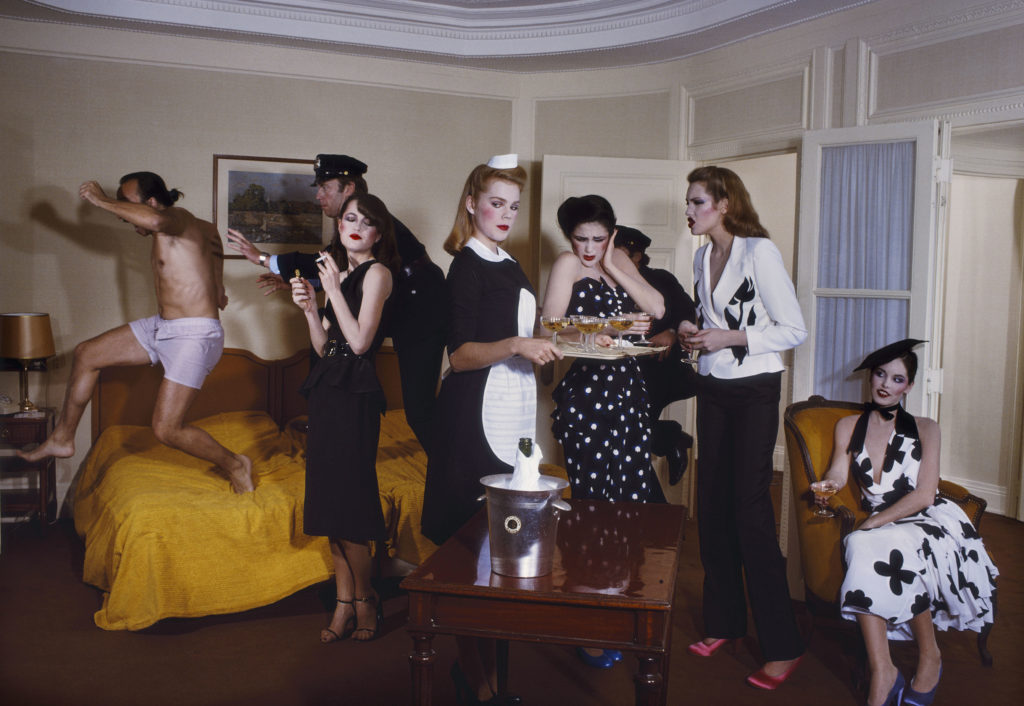
Guy Bourdin, Paris Vogue 1979,
Chloé spring-summer 1979 collection
©The Guy Bourdin Estate, 2017 / Courtesy A + C
To that effect, earlier shots portray an agrarian, bohemian vision of mid-century women frolicking in fields or a studio environment perhaps, while later stills feature a more decadent and diverse view of women—often in a salon setting or the streets of Paris at night.
“I had to imagine the photographs as a case study within a fashion context—I’m not a photography historian,” says Clark, aware of the eternal conflict of fashion photography’s blurry position between commercial photography and fine art, as well as her own as a curator of clothes rather than pictures. “I love Guy Bourdin but you need to do more than love Guy Bourdin to curate a Guy Bourdin show. So I had to look at it from the other way around, as one really important case study rather than trying to tell the whole story of his work.”
Adding conviction to her narrative, Clark has included a curation of images that feature no Chloé designs at all, with campaigns from French shoemaker Charles Jourdan and editorials from Vogue Paris enforcing her view of Bourdin as a master of perspective. Furthermore, her choice of scenography is decidedly plain, with no cosmetic grandeur other than a small archive room designed with giant wooden drawers.
“I have used the white-frame context of a photography exhibition at the Maison Chloé intentionally to create a counterpoint to the structures within it,” she says, “which are about looking at the Chloé archive with a spatial awareness around the dresses and how they can be made intimate, alien, or controlled when edited carefully.”
“Femininities—Guy Bourdin” is on view at the Maison Chloé, hotel particulier at 28 Rue de la Baume, Paris from July 4 until September 6, and re-opens during FIAC and Paris Photo from October 18 until November 18, 2017.
Book a free ticket at Chloe.com/Bourdin